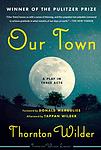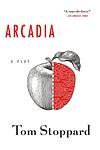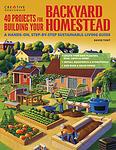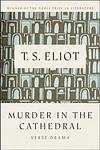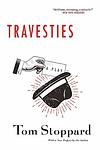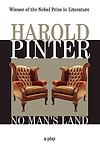The Greatest British, American "Plays, Fiction" Books Since 1900
Click to learn how this list is calculated.
This list represents a comprehensive and trusted collection of the greatest books. Developed through a specialized algorithm, it brings together 300 'best of' book lists to form a definitive guide to the world's most acclaimed books. For those interested in how these books are chosen, additional details can be found on the rankings page.
Genres
Plays are a category of literature that consists of written works intended for performance on stage. They typically feature dialogue between characters and are structured into acts and scenes. Plays can be comedic, tragic, or a combination of both, and often explore themes such as love, power, and morality. They are meant to be performed by actors in front of an audience, and can be enjoyed both as written works and as live performances.
Countries
Date Range
Reading Statistics
Click the button below to see how many of these books you've read!
Download
If you're interested in downloading this list as a CSV file for use in a spreadsheet application, you can easily do so by clicking the button below. Please note that to ensure a manageable file size and faster download, the CSV will include details for only the first 500 books.
Download-
1. A Streetcar Named Desire by Tennessee Williams
"A Streetcar Named Desire" is a classic American play that explores themes of desire, desperation, and decay through the story of Blanche DuBois, a former schoolteacher from a once-wealthy Southern family who moves in with her sister Stella and her brutish husband Stanley in their cramped apartment in New Orleans. As Blanche grapples with her own past traumas and the harsh realities of her present situation, her mental state deteriorates, leading to a tragic end. The play presents a stark contrast between the genteel Old South and the gritty, working-class reality of post-WWII America.
-
2. Long Day's Journey Into Night by Eugene O'Neill
"Long Day's Journey Into Night" is a semi-autobiographical play that explores the complex dynamics of a family tormented by addiction and regret. The narrative follows the Tyrone family, composed of two parents and their two adult sons, over the course of a single day. As the day progresses, the family members engage in soul-baring conversations that reveal their individual struggles with alcohol and drug addiction, their deep-seated resentments, and the love that binds them together despite their flaws. The play is a poignant examination of the human condition, familial bonds, and the destructive power of addiction.
-
3. Death Of A Salesman by Arthur Miller
This classic play explores the life of a failing salesman who, in his quest for the American Dream, struggles with his relationships and his own sense of reality. The protagonist's life spirals into despair as he grapples with his unfulfilled ambitions, strained family dynamics, and ultimately, his own mortality. The narrative delves deep into the themes of identity, illusion, and the destructive nature of the American Dream.
-
4. Pygmalion by George Bernard Shaw
"Pygmalion" is a play that explores the transformative power of education and the nature of language and communication. It follows the story of a cockney flower girl named Eliza Doolittle who is taught to speak and behave like a duchess by a pompous phonetics professor, Henry Higgins. Throughout the process, Eliza develops self-respect and personal dignity, challenging the Victorian society's rigid class system. The play also questions the idea of 'making' someone and the moral responsibility that comes with it.
-
5. A Raisin In The Sun by Lorraine Hansberry
The play explores the dreams and struggles of a Black family living on Chicago's South Side in the 1950s. When the family receives a $10,000 insurance check after the father's death, each member has different ideas about how to use the money. The mother wishes to buy a house to fulfill her late husband's dream of providing a better home for the family, while her son wants to invest in a liquor store to secure their financial future. The daughter seeks to use part of the money for her medical school tuition. Their conflicting aspirations and the pervasive racism of the era put a strain on the family's unity and values, as they strive to find their place in a world that often seems to work against them.
-
6. The Glass Menagerie by Tennessee Williams
A memory play set in St. Louis during the Great Depression, it follows the story of the Wingfield family. The protagonist, Tom, struggles with his role as the breadwinner for his overbearing mother, Amanda, and his physically and emotionally fragile sister, Laura, who spends her time with her collection of glass animals. The family's life takes a turn when Tom invites a gentleman caller home for dinner to meet Laura, causing tensions to rise and secrets to unfold.
-
7. The Crucible by Arthur Miller
Set during the Salem Witch Trials in the late 17th century, this play explores the hysteria, deceit, and religious extremism that plague a small Puritan village in Massachusetts. The protagonist, a flawed but essentially good man, is caught in a web of accusations when young girls in the town start displaying strange behavior and accusing others of witchcraft. The ensuing trials reveal not only the dangers of mass hysteria and false accusations, but also the destructive power of societal pressures and the human capacity for both cruelty and heroism.
-
8. Mourning Becomes Electra by Eugene O'Neill
"Mourning Becomes Electra" is a trilogy of plays that retells the Oresteia story of the House of Atreus in a modern American setting. The narrative explores the themes of revenge, obsession, and guilt within the Mannon family, who are haunted by a dark, cursed past. The plot follows the aftermath of the American Civil War, with the characters struggling to escape their tragic fate, ultimately leading to their downfall.
-
9. Rosencrantz & Guildenstern Are Dead by Tom Stoppard
The play is an absurdist, existential tragicomedy that follows two minor characters from Shakespeare's "Hamlet," Rosencrantz and Guildenstern, who are now the protagonists in their own story. As they stumble through philosophical debates and encounter a troupe of actors while trying to understand the nature of reality and their own existence, they find themselves increasingly out of their depth in a world where they have little control over their fate. The narrative weaves in and out of events from "Hamlet," offering a humorous and poignant perspective on free will, chance, and the search for meaning in a seemingly indifferent universe.
-
10. Our Town by Thornton Wilder
This play is a poignant depiction of life in a small American town called Grover's Corners, New Hampshire, at the turn of the 20th century. Through the everyday lives of its citizens, the narrative explores universal themes of love, marriage, mortality, and the passage of time. The story is narrated by a stage manager who directly addresses the audience and interacts with the characters, guiding viewers through the experiences of two families, the Gibbs and the Webbs. The play's minimalist staging and meta-theatrical elements emphasize the ephemeral nature of human existence, encouraging the audience to appreciate the beauty of life's ordinary moments.
-
11. The Iceman Cometh by Eugene O'Neill
"The Iceman Cometh" is a play set in a New York City bar in 1912, featuring a group of down-and-out alcoholics who spend their days in a state of drunken stupor, telling tall tales and dreaming of better futures. The arrival of a former patron, now sober, disrupts their routine as he insists on forcing them to face the harsh realities of their lives and abandon their delusions. The play is a poignant exploration of despair, disillusionment, and the human capacity for self-deception.
-
12. Arcadia by Tom Stoppard
"Arcadia" is a play that intertwines two timelines, set in the same English country house but centuries apart. In the early 19th century, a gifted young girl and her tutor delve into intellectual pursuits, exploring mathematics, nature, and the early inklings of chaos theory, while around them, the adults engage in witty repartee, romantic entanglements, and poetic rivalries. In the present day, scholars and descendants of the house's historical residents attempt to piece together the past, often misinterpreting the evidence they find. The play explores themes of time, truth, and the impact of the past on the present, all while showcasing the enduring nature of human curiosity and the quest for knowledge.
-
13. Fences by August Wilson
The play explores the life of an African American family in the 1950s, focusing on the complex relationships between a father, who once aspired to be a professional baseball player but was thwarted by racial discrimination, and his family. The father's bitterness and frustrations over his unfulfilled dreams and the racial barriers of his time manifest in his relationships with his sons, who have their own hopes and ambitions. The narrative delves into themes of generational conflict, racial inequality, and the struggle for personal fulfillment, all symbolized by the fence the father builds around his yard, which serves as a metaphor for both division and protection.
-
14. Look Back In Anger by John Osborne
The play centers around Jimmy Porter, an intelligent and educated but disaffected young man of working-class origin who is married to Alison, a woman from a more privileged background. Set in post-war Britain, the narrative captures the couple's volatile relationship and Jimmy's frustration with the lack of opportunities and the class structure that he feels traps him. The arrival of Alison's friend, Helena, adds further tension as she both criticizes and is attracted to Jimmy's raw passion. Themes of anger, class conflict, and disillusionment with the establishment are woven throughout the play, which ultimately explores the complexities of human relationships and societal expectations.
-
15. Angels In America by Tony Kushner
The play is a profound and complex exploration of the AIDS crisis in the 1980s, intertwining the lives of several characters grappling with their sexuality, religion, and politics. Set against the backdrop of a conservative Reagan-era America, it delves into themes of abandonment, race, and the supernatural, as characters confront personal and societal challenges. The narrative weaves together the stories of a gay man diagnosed with AIDS, his closeted and conflicted lover, a Mormon couple facing their own crises, and a notorious real-life lawyer, Roy Cohn, also battling AIDS. Ethereal beings, including a heralding angel, intersect with the characters' lives, adding a fantastical dimension to the play's commentary on human suffering, redemption, and the quest for justice and love.
-
16. Murder In The Cathedral by T. S. Eliot
The play dramatizes the internal conflict of a 12th-century archbishop, Thomas Becket, as he grapples with the temptation of spiritual pride and the implications of defying King Henry II. Upon his return from exile, Becket faces pressure from the king and his own tempters to compromise his principles for safety and convenience. Ultimately, Becket chooses to embrace his role as a martyr, fulfilling his duty to God over the monarchy. His assassination in Canterbury Cathedral by the king's knights is depicted as an act of martyrdom, exploring themes of faith, loyalty, and the struggle between church and state.
-
17. Travesties by Tom Stoppard
The play is a comedic and intellectual romp through Zurich during World War I, where the lives of historical figures like the Dadaist Tristan Tzara, the novelist James Joyce, and the communist revolutionary Lenin intersect through the unreliable memories of British consular official Henry Carr. The narrative is a playful, non-linear exploration of art, politics, and the nature of memory, blending slapstick humor with sharp wit and literary allusions. The work challenges the audience to consider the role of the artist in society and the impact of political upheaval on cultural expression, all while questioning the reliability of history and the very nature of truth itself.
-
18. True West by Sam Shepard
The play is a darkly comedic exploration of the volatile relationship between two estranged brothers who are brought together at their mother's suburban California home. The older brother, a struggling screenwriter, is working on a script while housesitting, only to be interrupted by his younger sibling, a drifter and thief. What follows is an intense, often surreal, confrontation that challenges their identities and aspirations, ultimately leading to a role reversal as they vie for the approval of a Hollywood producer. Their conflict escalates to a point of no return, symbolizing the clash of American myths and realities and questioning the very nature of authenticity and success.
-
19. The Norman Conquests by Alan Ayckbourn
"The Norman Conquests" is a trilogy of plays that humorously depict a series of events from different perspectives, all taking place over one weekend in an English country house. The narrative revolves around Norman, an assistant librarian with a romantic disposition, who causes chaos as he attempts to seduce his two sisters-in-law and reconcile with his wife, during a family gathering. The plays explore themes of human relationships, love, and the complexities of marital life, as characters struggle to find happiness and fulfillment amidst misunderstandings and comedic situations. Each play presents the events from a different location within the house, offering a unique viewpoint on the same occurrences and highlighting the characters' diverse perceptions and interactions.
-
20. The Homecoming by Harold Pinter
"The Homecoming" is a play that delves into the complex dynamics of a dysfunctional family when the eldest son returns home after a long absence. Set in North London, the story unfolds in the family's house, where the son introduces his wife to his domineering father, his uncle, and his two brothers. Tensions rise as the family's power struggles and hidden resentments come to the fore, leading to a shocking and unsettling realignment of relationships within the household. The play explores themes of power, sexuality, and the search for identity within the confines of a seemingly traditional family structure.
-
21. Waiting For Lefty by Clifford Odets
This play is a powerful and emotionally charged piece of American agitprop theater that centers on the struggles of taxi drivers in the 1930s facing exploitative working conditions. Through a series of vignettes and monologues, it delves into the lives of individual workers, revealing their personal hardships and the impact of broader social injustices. The narrative builds towards a climactic union meeting where the characters debate whether to strike against their oppressive bosses. The play is renowned for its leftist political stance and its call to collective action, encapsulating the spirit of working-class resistance and solidarity during a time of economic turmoil.
-
22. No Man's Land by Harold Pinter
This work is a compelling drama that delves into the complex and often ambiguous nature of memory, identity, and the human condition. Set in a single room, the play unfolds through the interactions between two men, Hirst and Spooner, who meet in a London pub and continue their encounter at Hirst's upscale home. As the evening progresses, their conversation becomes increasingly enigmatic, revealing layers of manipulation, power dynamics, and the fragility of their pasts. The presence of two other characters, Briggs and Foster, adds to the tension and mystery, leaving audiences to ponder the realities of the characters' lives and the truths buried in their stories. The play is a masterful exploration of language, silence, and the spaces between people, showcasing the playwright's signature blend of wit, irony, and emotional depth.
-
23. Machinal by Sophie Treadwell
The play is a powerful expressionist work that follows the life of a young woman who feels trapped and dehumanized by the societal expectations and mechanical nature of the early 20th-century urban environment. She is suffocated by her mundane job, an oppressive marriage to her boss, and the overall constraints of a patriarchal society. Her desperate longing for freedom and individuality leads her down a dark path that culminates in a shocking and tragic act, ultimately resulting in her entanglement with the justice system. The narrative is a critique of the industrial age and its impact on the human spirit, exploring themes of autonomy, alienation, and the crushing force of societal norms.
-
24. Noises Off by Michael Frayn
The book in question is a comedic narrative that takes readers behind the scenes of a chaotic and farcical theatrical production. It humorously details the mishaps, misunderstandings, and mayhem that ensue both on and offstage as a cast of eccentric actors attempts to present a play to their audience. With a play-within-a-play structure, the book provides a satirical look at the world of theater, showcasing the fragile egos, romantic entanglements, and technical disasters that can collide with disastrous and hilarious results. As the characters scramble to keep their performance from falling apart, the line between their on-stage roles and off-stage lives blurs, creating a whirlwind of slapstick and comedic timing that has delighted readers and audiences alike.
-
25. Toys In The Attic by Lillian Hellman
"Toys in the Attic" is a dramatic play that delves into the complexities of family dynamics and the corrosive power of greed and secrets. Set in early 20th-century New Orleans, it follows the Berniers sisters, whose lives are upended when their younger brother returns home with his new, wealthy wife. The sudden influx of wealth exposes hidden jealousies, suppressed desires, and societal pressures that threaten to unravel the fabric of the family. As the characters confront their personal demons and the consequences of their choices, the play examines themes of moral decay, the illusion of genteel Southern society, and the destructive nature of lies and deceit.
Reading Statistics
Click the button below to see how many of these books you've read!
Download
If you're interested in downloading this list as a CSV file for use in a spreadsheet application, you can easily do so by clicking the button below. Please note that to ensure a manageable file size and faster download, the CSV will include details for only the first 500 books.
Download








